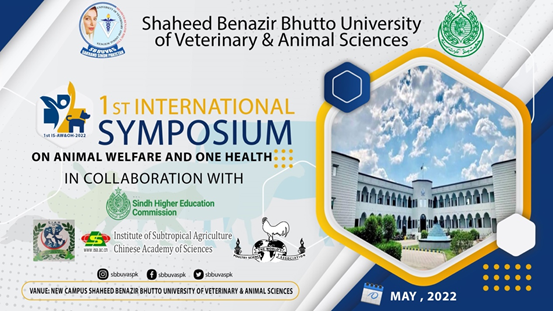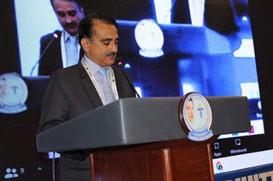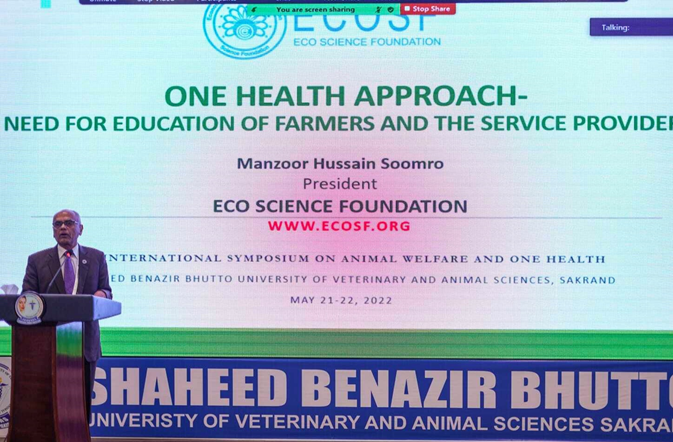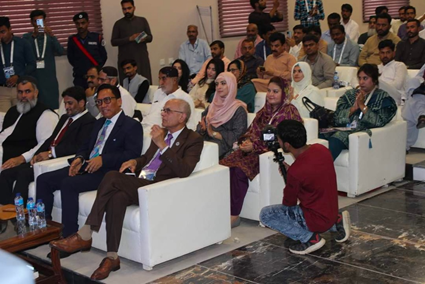Shaheed Benazir Bhutto University of Veterinary and Animal Sciences Sakrand Sindh- Pakistan organized their 1st International Symposium on Animal Welfare and One Health, President ECOSF attended as Invited Speaker
Go Back


The 1st International Symposium on “Animal Welfare and One Health” was organized on 21-22 May 2022 by the Shaheed Benazir Bhutto University of Veterinary and Animal Sciences (SBBUVAS), Sakrand, Sindh-Pakistan. Experts from home and abroad shared their research and policy work about the animal welfare and their health and transmission of animal diseases to human beings; thereby highlighting the “One Health” concepts and global developments in the sector. The symposium was mainly supported by the provincial Government of Sindh through its Higher Education Commission.
 Vice Chancellor of the University Prof. Dr. Muhammad Farooq Hassan welcomed the distinguished speakers and the guests for their participation in the conference. He highlighted the aims and objectives of the establishment of the young university (SBBUVAS) and the purpose of this very first international symposium of the university. Renowned animal sciences researchers and One Health experts from within Pakistan and those from Australia, China, Indonesia, Italy, New Zealand, Spain, USA, and United Kingdom participated in person and virtually.
Vice Chancellor of the University Prof. Dr. Muhammad Farooq Hassan welcomed the distinguished speakers and the guests for their participation in the conference. He highlighted the aims and objectives of the establishment of the young university (SBBUVAS) and the purpose of this very first international symposium of the university. Renowned animal sciences researchers and One Health experts from within Pakistan and those from Australia, China, Indonesia, Italy, New Zealand, Spain, USA, and United Kingdom participated in person and virtually.
A number of local provincial legislators and public personalities including, members of Provincial Assembly, Vice Chancellors, Director General Livestock and notables joined different sessions of the symposium. H.E. Mr. Muhammad Ismail Rahoo, Provincial Minister for the Universities was the chief guest in the closing session and was presented with the recommendations of the symposium.
Prof. Manzoor Hussain Soomro, President ECOSF was an invited speaker. He spoke on “One Health Approach: Need for Education of Farmers and the Service Providers”. He explained the concept of One Health as an approach calling for “the collaborative efforts of multiple disciplines working locally, nationally, and globally, to attain optimal health for people, animals and our environment”. The concept was developed in response to evidence of the spreading zoonotic disease between species and increasing awareness of “the interdependence of human and animals health and ecological change”. He emphasized that stakeholders, mainly the farmers and service providers should have the capacity to practice the One Health approach. Whether the present- day farmers and service providers are capable enough tackle the current challenges of climate change and environmental health and remain competitive, he questioned.

Dr. Soomro said that the time-tested methodology for capacity building of stakeholders has been; the inquiry-based and hands-on non-formal learning methodology– The Farmer Field School (FFS) approach for understanding the factors responsible for various challenges and the changes in ecosystems and their prevention, skill development, technology use and management as a whole. He also elaborated the FFS methodology, structure and general contents saying that it is school without walls, held every week in a participatory manner; wherein the participants explore the Issues, brainstorm, observe experiment like scientists, collect and analyze data and take collective decisions. The approach empowers participants to decide on the basis data from their crops, livestock and ecosystems. Dr. Soomro also assured the university management of facilitating their scientific cooperation with their counterparts in other ECO member countries.
 Prof. Dr. Graeme B. Martin from the University of Western Australia made a presentation on “The New Face of Livestock Science: Global Context, Local Action”. In his presentation, he said that it is difficult to predict the future and the uncertainty seems to increase exponentially in the future. He added that our markets would continue to maintain pressure for livestock industries to reduce their dependence on chemicals, reduce their environmental impact and simultaneously improve the health and welfare of animals. The principle of “clean, green and ethical management” is now universally understood, if not always followed. We have a global context for the future of livestock science-increasing demand for animal-based food in the face of limited resources and global warming-and we also have a great variety of local actions that would offer solutions while making our industries more clean, green and ethical, as well as productive.
Prof. Dr. Graeme B. Martin from the University of Western Australia made a presentation on “The New Face of Livestock Science: Global Context, Local Action”. In his presentation, he said that it is difficult to predict the future and the uncertainty seems to increase exponentially in the future. He added that our markets would continue to maintain pressure for livestock industries to reduce their dependence on chemicals, reduce their environmental impact and simultaneously improve the health and welfare of animals. The principle of “clean, green and ethical management” is now universally understood, if not always followed. We have a global context for the future of livestock science-increasing demand for animal-based food in the face of limited resources and global warming-and we also have a great variety of local actions that would offer solutions while making our industries more clean, green and ethical, as well as productive.
Prof. Craig Johnson of Massy University New Zealand on the importance of sentience when considering welfare for different animals. He shared that we can identify sentience in very diverse groups of animals. He further said that animals are the Concept of Welfare Importance. As long as, they have existed, human have had relationships with animals of other species. He said the subject was developed with considerations of animals used in research, but has since expanded into a wider consideration of
overall quality of life for all animals that have contact with humans. Several other international speakers including the Editor in Chief of Reproduction, Fertility and Development Journal, Prof. Margaret Rayman of the University of Surrey, UK, Prof. Clive Philips of Curtin University, Australia, Prof. Xin Wu of the Chinese Academy of Sciences, Prof. Jesus of University of Santiago de Comppostela-IDIS Spain, Prof. Umberto of ISS from Italy were also among the invited International Speakers.
Overall, the national and local speakers emphasised on the need for organizing more symposiums of this kind which provide opportunity to the young faculty, students and the public at large to know more about the diseases in the animals as how to avoid their transmission in the masses.